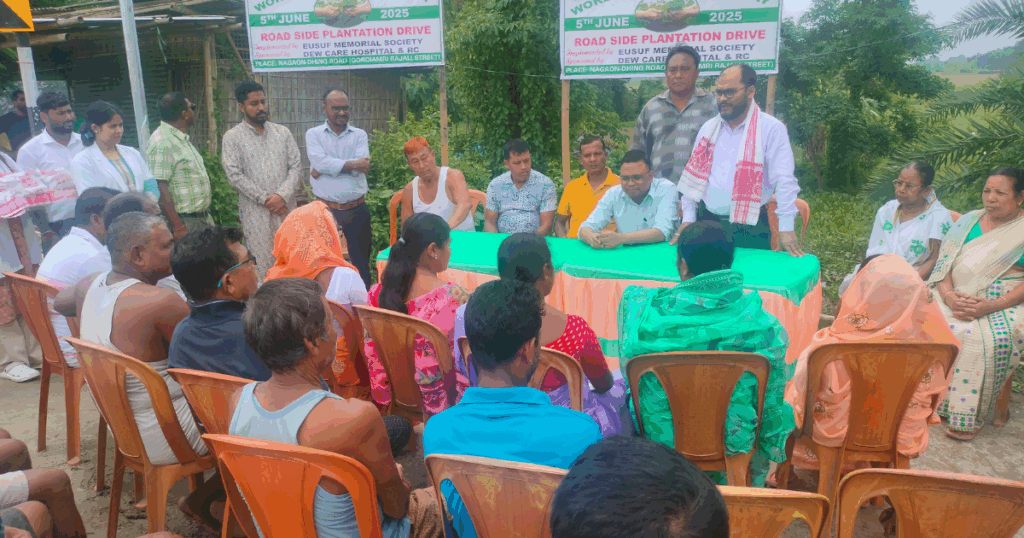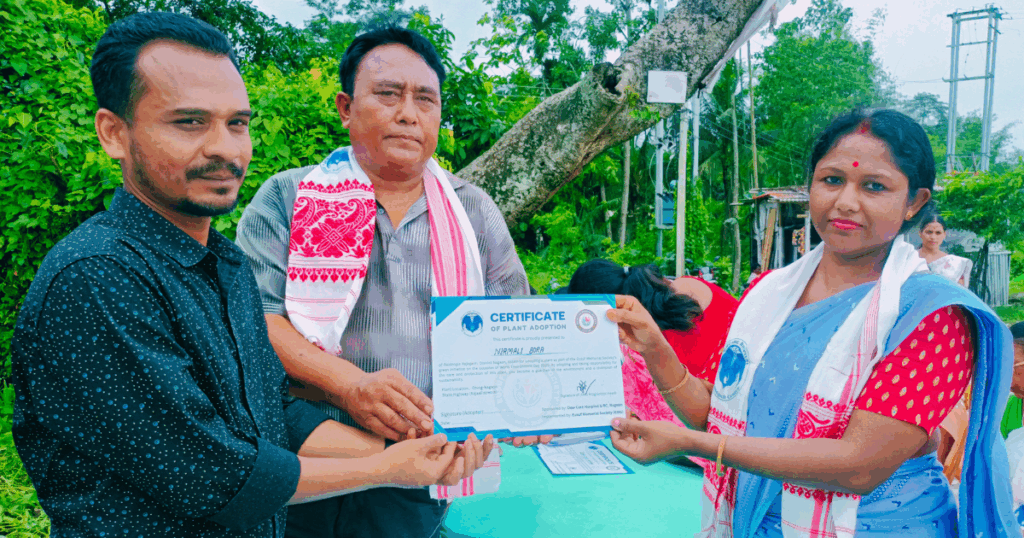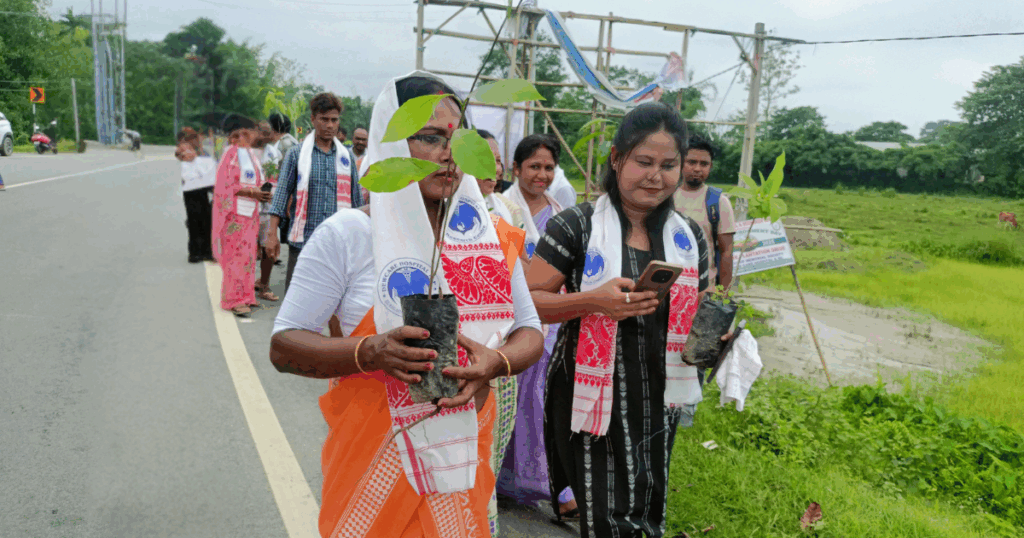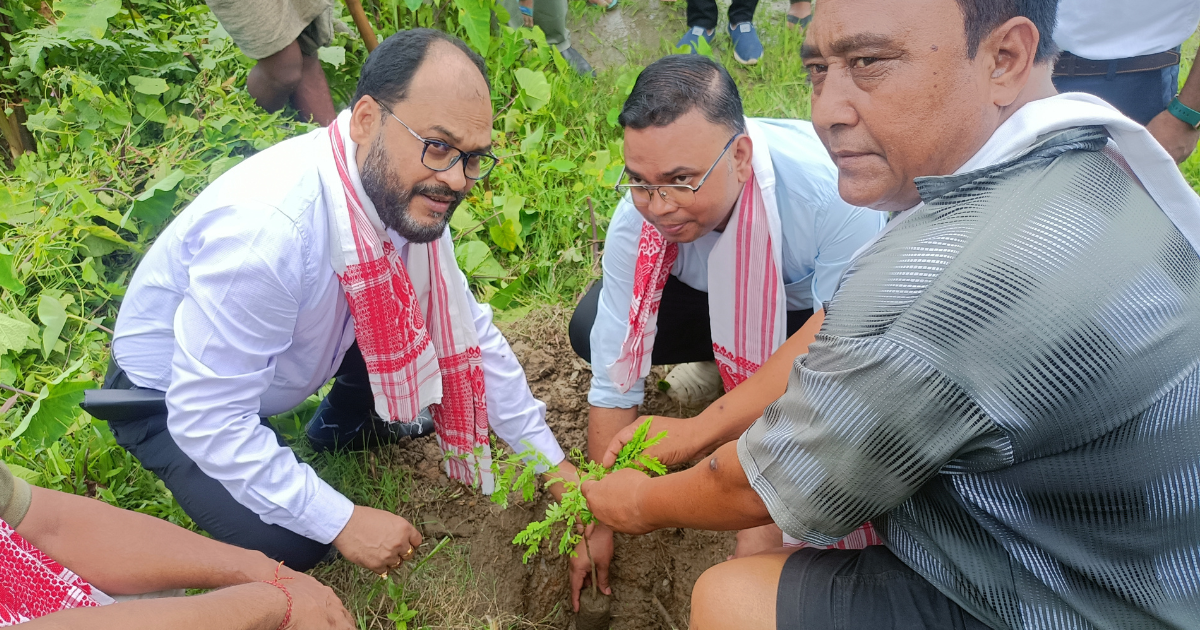On 5th June 2025, in celebration of World Environment Day, the quiet stretch of the Nagaon-Dhing State Highway from Goroimari to Rajali witnessed a powerful transformation. Not through machines or heavy construction—but through the hands and hearts of local villagers, determined to bring green back to their environment. This grassroots Roadside Plantation Drive was a joint initiative sponsored by Dew Care Hospital and Research Centre, Nagaon, and implemented by Eusuf Memorial Society, an NGO championing health and environmental causes.

A Day of Purpose and Participation
The day began with a formal gathering at 9:30 AM, setting the tone for what would become a symbol of collective environmental responsibility. The meeting was attended by over 100 villagers, predominantly from Raidongia Rajagaon village, along with key stakeholders from Dew Care Hospital.
Dr. Foridul Hussain, Managing Director of the hospital, delivered a heartfelt keynote that inspired the community to take ownership of environmental change. Emphasizing the link between environmental health and human well-being, Dr. Hussain called upon everyone to take simple yet impactful steps—like planting and protecting trees—to ensure a better future.
This was more than just a speech. It was a call to action. One community member spoke emotionally about how meaningful it was to be part of such a noble cause. The excitement and sincerity in the gathering were palpable.

Planting Trees, Planting Hope
What set this plantation drive apart from typical green initiatives was the deep sense of ownership. Each participant was assigned one or more saplings, and more importantly, received a “Plant Adoption” certificate—turning a symbolic gesture into a personal responsibility. Participants named their saplings, discussed how they’d care for them, and committed to nurturing them as part of their extended family.
Families brought children, women and youth participated in large numbers, and the event turned into a celebration of nature and community. Saplings weren’t just planted; they were protected with fencing materials to ensure survival. This thoughtful touch addressed a common problem—livestock damage in roadside plantations—ensuring that the effort would not go to waste.
The Backbone: Eusuf Memorial Society
The seamless execution of the event was credited to the meticulous planning by Eusuf Memorial Society. From logistics to mobilization, the NGO ensured that the event remained inclusive, well-coordinated, and meaningful.
They also provided white caps to all participants, a simple but powerful gesture symbolizing unity and shared purpose. Their representatives actively engaged with the community, guiding them on proper plantation techniques, and helping turn a routine activity into a powerful learning experience.
Refreshments, Reflections, and Resolutions
Following the planting session, refreshments were served to all attendees—an appreciation of their time and commitment. Conversations over snacks were filled with plans for the future: how similar drives could be held in schools, other villages, and even towns.
The day ended with a heartfelt vote of thanks by a member of Eusuf Memorial Society, who applauded the efforts of Dew Care Hospital and the villagers. It was clear: this was not a one-off event but the beginning of something bigger.

Long-Term Vision and Lasting Impact
The plantation drive wasn’t just a single-day event. It sowed the seeds for a sustainable future built on community participation. Key outcomes include:
- Over 100 villagers actively adopting and pledging to care for saplings.
- Certificates of adoption creating a personal connection with nature.
- Protection measures ensuring a high survival rate of the plants.
- High involvement of youth and women, ensuring long-term cultural integration.
- A scalable model for similar green drives across Assam.
Looking ahead, follow-up visits and community-led growth monitoring are planned. Schools, women’s groups, and youth clubs will be roped in for long-term engagement. With time, the newly planted stretch could become a model green corridor—an example for neighboring regions to emulate.
Conclusion
The World Environment Day Plantation Drive along the Nagaon-Dhing Highway proved that when communities are empowered, they can lead meaningful environmental change. Through shared responsibility, emotional engagement, and smart collaboration between NGOs and healthcare institutions, a simple act of planting a tree became a powerful statement of unity and hope.
The saplings planted on that June morning are more than trees—they are symbols of what a united community can achieve when inspired by purpose.

